#umkhonto we sizwe
Text
1990 - Nelson Mandela speaks about the ANC's support for the Palestinian fight for freedom from the Israeli occupation.
"As far as Yasser Arafat is concerned,
I explained to Mr. Siegman that we identify with the PLO,
because just like ourselves,
they are fighting for the right of self-determination."
This interview was held a few months after Mandela was released from prison, where he had been locked away by the South African government for 27 years, for being one of the leaders of uMkhonto we Sizwe, the paramilitary wing of the ANC, which violently fought against the South African apartheid government. [video]

#nelson mandela#solidarity#palestine#free palestine#south africa#apartheid#occupation#uMkhonto we Sizwe#video#1990#mandela#resistance#violence#terrorism#antifascism#communism#ANC#guerrilla#anti-colonialism
223 notes
·
View notes
Photo

Chris Hani, of the South African Communist Party and chief of staff of uMkhonto we Sizwe, at rally in Lady Frere, Transkei, October 1990.
#South African Communist Party#Communist#Chris Hani#Umkhonto we Sizwe#South Africa#Liberation#National Liberation#Socialism#Communism
171 notes
·
View notes
Text

Viva Umkhonto!
#art#artists on tumblr#digital art#vintage#expiremental#design#government#politics#history#ANC#apartheid#nelsonmandela#umkhonto we sizwe#SACP#Oliver Tambo#Chris Hani#Joe Slovo#Nelson Mandela#black consciousness#viva umkhonto#south africa#pan africanism#pan african#communism#socialism#anarchism#marxism#leftism#marxism leninism#cold war
24 notes
·
View notes
Text

Launched in 1961 by leaders of the African National Congress (ANC) of South Africa and the South African Communist Party (SACP), Umkhonto we Sizwe (MK) was the military wing of the ANC until its disbandment in 1993.
29 notes
·
View notes
Text
The ANC's use of the death penalty!
The ANC’s use of the death penalty!

View On WordPress
0 notes
Text
Recordando a “Madiba”; luz y sombra
Recordando a “Madiba”; luz y sombra
#aperturaintelectual #vmrfaintelectual
@victormanrf
@Victor M. Reyes Ferriz
@vicmanrf
@victormrferriz
Víctor Manuel Reyes Ferriz
18 DE JULIO DE 2023 Recordando a “Madiba”; luz y sombra
POR: VÍCTOR MANUEL REYES FERRIZ
De manera general, no soy partícipe de que sean creados días especiales por algún acontecimiento, persona, suceso o causa ya que, esa es la primera línea de discriminación o por el contrario de resaltar “algo” como más importante que lo demás; empero, el día de hoy se celebra en todo el mundo el “Día…
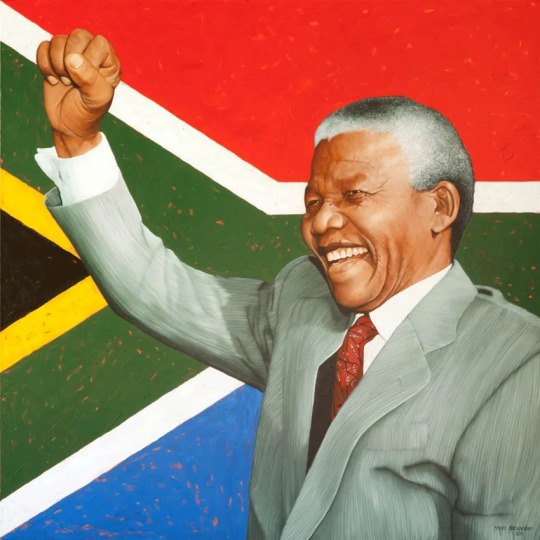
View On WordPress
#AperturaIntelectual#vmrfaintelectual#Afrikáneres#Apartheid#“Umkhonto we Sizwe” (La lanza de la Nación)#Congreso Nacional Africano#Corrupción mundial Sudáfrica 2010#Creación de Sudáfrica#Día Internacional de Nelson Mandela#Estado blanco#Frederik Willem de Klerk#Lado oscuro de Madiba#Lengua Xhosa#Mahatma Gandhi#Martin Luther King Jr#Michael King Jr#Mohandas Karamchand Gandhi#Nelson Rolihlahla Mandela “Madiba”#República de Sudáfrica#Segregación racial#Supremacía blanca#Víctor Manuel Reyes Ferriz#VMRF
2 notes
·
View notes
Text
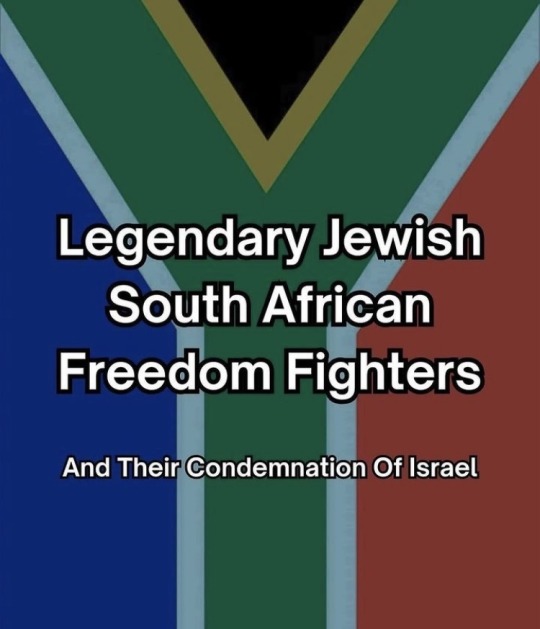
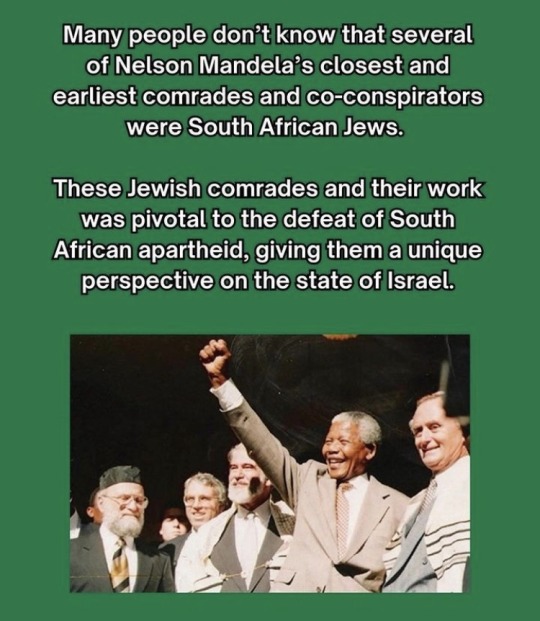
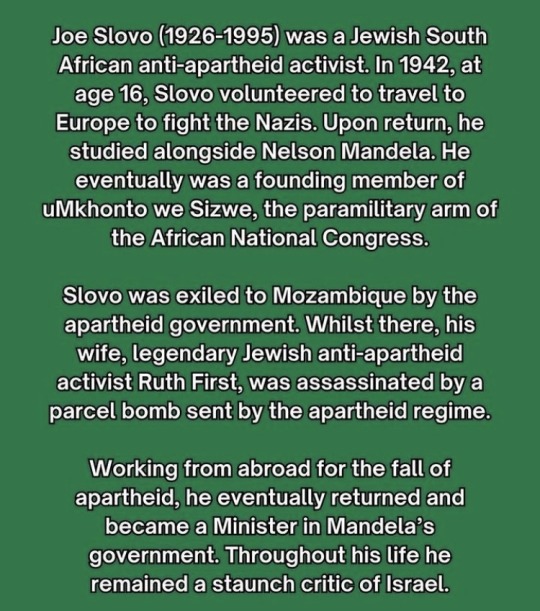
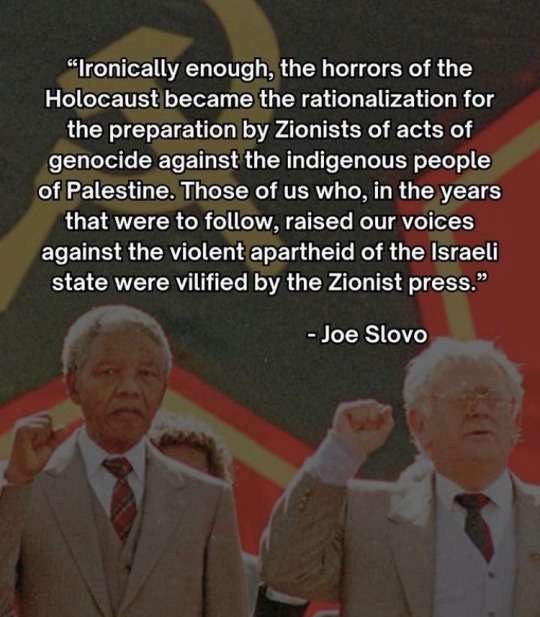
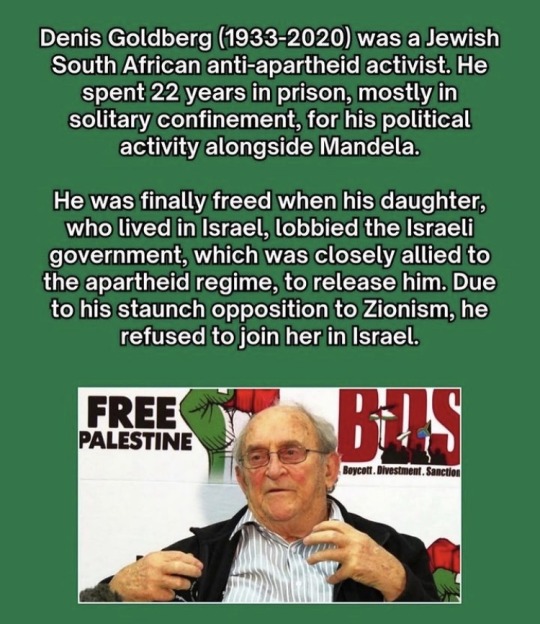
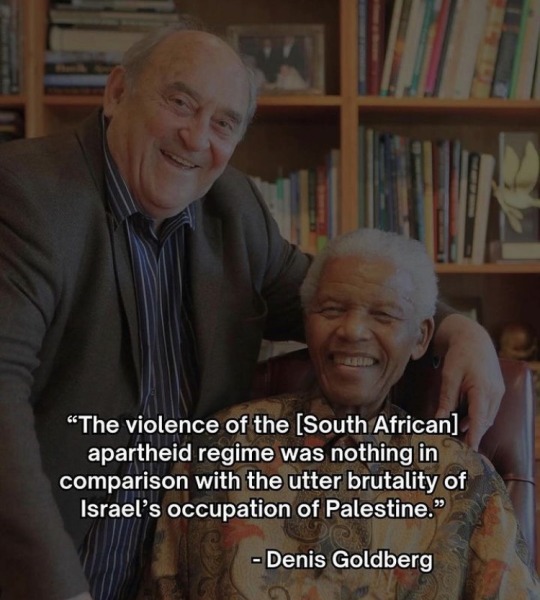
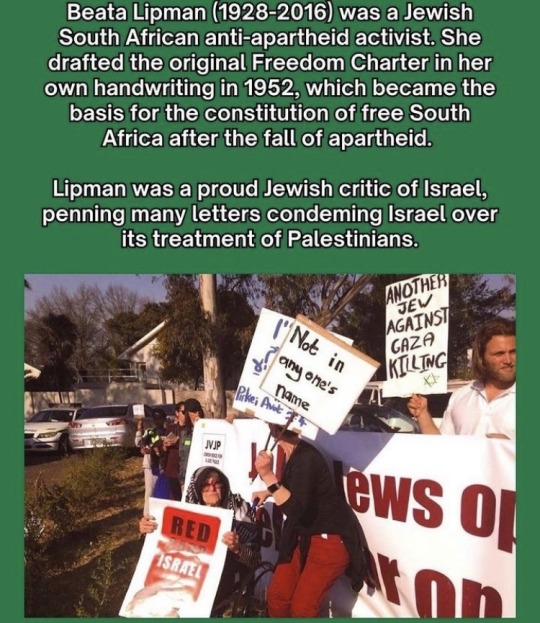
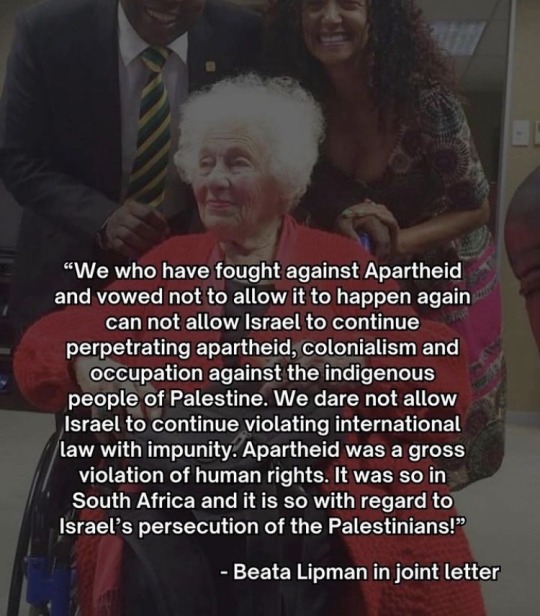
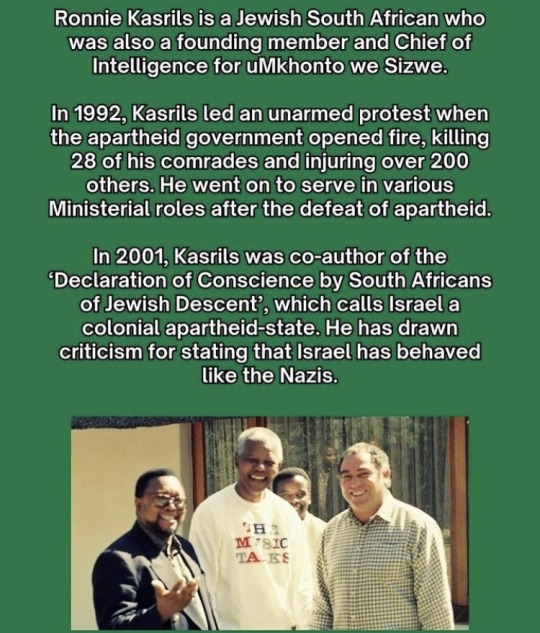
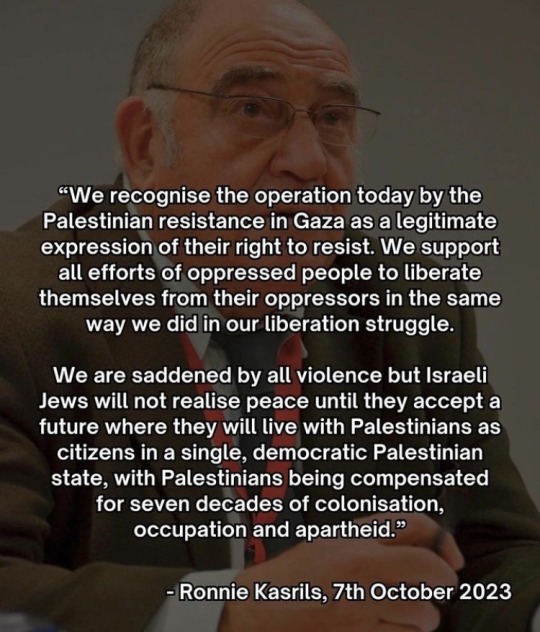
Image transcriptions below:
Legendary South African Jewish Freedom Fighters
And Their Condemnation of Israel
Many people don't know that several of Nelson Mandela's closest and earliest comrades and co-conspirators were South African Jews.
These Jewish comrades and their work was pivotal to the defeat of South African apartheid, giving them a unique perspective on the state of Israel.
—
Joe Slovo (1926-1995) was a Jewish South African anti-apartheid activist. In 1942, at age 16, Slovo volunteered to travel to Europe to fight the Nazis. Upon return, he studied alongside Nelson Mandela. He eventually was a founding member of uMkhonto we Sizwe, the paramilitary arm of the African National Congress.
Slovo was exiled to Mozambique by the apartheid government. Whilst there, his wife, legendary Jewish anti-apartheid activist Ruth First, was assassinated by a parcel bomb sent by the apartheid regime.
Working from abroad for the fall of apartheid, he eventually returned and became a Minister in Mandela's government. Throughout his life he remained a staunch critic of Israel.
—
"Ironically enough, the horrors of the Holocaust became the rationalization for the preparation by Zionists of acts of genocide against the indigenous people of Palestine. Those of us who, in the years that were to follow, raised our voices against the violent apartheid of the Israeli state were vilified by the Zionist press."
- Joe Slovo
—-
Denis Goldberg (1933-2020) was a Jewish South African anti-apartheid activist. He spent 22 years in prison, mostly in solitary confinement, for his political activity alongside Mandela.
He was finally freed when his daughter, who lived in Israel, lobbied the Israeli government, which was closely allied to the apartheid regime, to release him. Due to his staunch opposition to Zionism, he refused to join her in Israel.
—
"The violence of the [South African] apartheid regime was nothing in comparison with the utter brutality of Israel's occupation of Palestine."
- Denis Goldberg
—
Beata Lipman (1928-2016) was a Jewish South African anti-apartheid activist. She drafted the original Freedom Charter in her own handwriting in 1952, which became the basis for the constitution of free South Africa after the fall of apartheid.
Lipman was a proud Jewish critic of Israel, penning many letters condeming Israel over its treatment of Palestinians.
—
"We who have fought against Apartheid and vowed not to allow it to happen again can not allow Israel to continue perpetrating apartheid, colonialism and occupation against the indigenous people of Palestine. We dare not allow Israel to continue violating international law with impunity. Apartheid was a gross violation of human rights. It was so in South Africa and it is so with regard to Israel's persecution of the Palestinians!"
- Beata Lipman in joint letter
—
Ronnie Kasrils is a Jewish South African who was also a founding member and Chief of Intelligence for uMkhonto we Sizwe.
In 1992, Kasrils led an unarmed protest when the apartheid government opened fire, killing 28 of his comrades and injuring over 200 others. He went on to serve in various Ministerial roles after the defeat of apartheid.
In 2001, Kasrils was co-author of the
*Declaration of Conscience by South Africans of Jewish Descent, which calls Israel a colonial apartheid-state. He has drawn criticism for stating that Israel has behaved like the Nazis.
—
"We recognise the operation today by the Palestinian resistance in Gaza as a legitimate expression of their right to resist. We support all efforts of oppressed people to liberate themselves from their oppressors in the same way we did in our liberation struggle.
We are saddened by all violence but Israeli Jews will not realise peace until they accept a future where they will live with Palestinians as citizens in a single, democratic Palestinian state, with Palestinians being compensated for seven decades of colonisation, occupation and apartheid."
- Ronnie Kasrils, 7th October 2023
#free palestine#palestine#gaza#hamas#israel#fuck israel#freedom fighters#resistance#south africa#israel is an apartheid state#apartheid#genocide#from the river to the sea palestine will be free
2K notes
·
View notes
Text
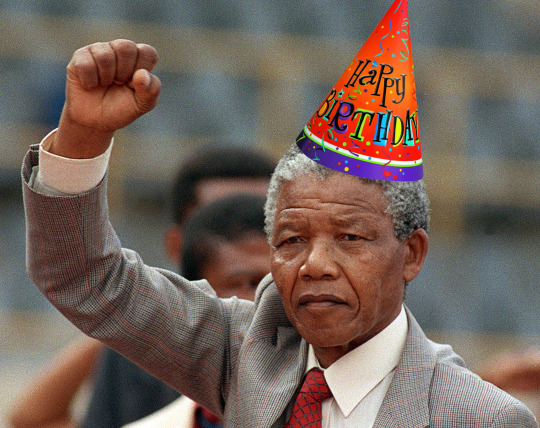
Happy birthday, Nelson Mandela! (July 18, 1918)
One of the most famous freedom fighters in the history of Africa, Nelson Mandela was born into a prominent Xhosa family in Mvezo, South Africa. He studied law and worked as a lawyer in Johannesburg before involving himself in the struggle against apartheid, the system of racial segregation imposed by South Africa's ruling white minority. He joined the African National Congress, which he would later go on to lead, as well as the South African Communist Party, having come to embrace socialism and Pan-Africanism. He was originally committed to nonviolent protest, but ultimately founded the uMkhonto we Sizwe ("Spear of the Nation" in Xhosa), the ANC's paramilitary wing, and led them in violent resistance to the apartheid government. Mandela was captured and imprisoned for 27 years, becoming an internationally-recognized political prisoner and representative of the anti-apartheid struggle before his release in 1990. Mandela was instrumental in negotiating the end of apartheid, and in South Africa's first multiracial elections, was elected President. He served from 1994 to 1999, overseeing a reckoning with apartheid's legacy, as well as introducing moderate social reforms, though never pursuing particularly radical policies. After leaving office, Mandela remained an elder statesman and an international figure until his death in 2013.
"During my lifetime I have dedicated myself to this struggle of the African people. I have fought against white domination, and I have fought against black domination. I have cherished the ideal of a democratic and free society in which all persons will live together in harmony and with equal opportunities. It is an ideal which I hope to live for. But, my lord, if needs be, it is an ideal for which I am prepared to die."
300 notes
·
View notes
Text
In the international corporate media, the story is mostly portrayed either as a bilateral war between Israel and Gaza, or as one-sided, senseless Palestinian aggression devoid of any context. The missing context, of course, is that the Palestinian people have endured ages of colonial subjugation, especially Palestinians in the Gaza Strip.
As I said, the images are gruesome and horrifying. It is impossible not to be affected by them. However, they do not stand on their own. Beyond the aforementioned historical context, in the past two decades, Gaza has been reduced to dust time and again by Israeli air raids and military operations. Now, once again, the bombing has already started—and within the mainstream of Israeli society and its media, there is open discussion of carrying out a genocide in Gaza. If this is not prevented, it could indeed take place.
If we ask Palestinians to not turn to violence, we must not forget the reality they confront. When Palestinians in Gaza marched at the Israeli barrier that imprisons them in 2017-18, they were shot dead in the hundreds. The images circulating now are gruesome and shocking. I don’t intend to euphemize, justify, or condone—but in the course of struggle, the path to liberation almost always takes grotesque turns.
The African National Congress [one of the chief umbrella organizations that fought against apartheid in South Africa] is often ignorantly celebrated as a reference point by those who seek to argue that violence has no role in struggle. But after the establishment of its military wing, the MK [uMkhonto we Sizwe, “Spear of the Nation”], the ANC never renounced violence. Nelson Mandela [a member of the ANC and co-founder of the MK] refused to do so even after decades of imprisonment. In 1985, the then president of the ANC, Oliver Tambo, told the Los Angeles Times,
“In the past, we were saying the ANC will not deliberately take innocent life, but now, looking at what is happening in South Africa, it is difficult to say civilians are not going to die.”
The context of struggle here is between a nuclear military superpower and a dispossessed people. Colonialism does not relent. Colonialism will not step back of its own accord, not even if you ask nicely. Decolonialism is a noble cause, but the path to achieve it is often ugly and tainted by violence. In the absence of any realistic alternative to achieve liberation, people are forced into carrying out unjustifiable acts. It’s a fundamental reality of the disparity of power. To demand that the oppressed always act in the purest of ways is to demand they remain forever in servitude.
128 notes
·
View notes
Note
Do you condemn Nelson Mandela and his attacks on white south Africans during the apartheid era?
you know what, I like Mandela and try and learn from South Africa (all my friend definatly want to steal the idea of the Truth and Reconciliation Commission to be used here), so you get an answer. I will refer to the ANC in my answer (specifically uMkhonto we Sizwe), which I believe is what you are asking about.
I have read parts of the findings of the Truth and Reconciliation Commission, and with accordance of their findings, it's a yes. The ANC did try to uphold as much as they could of the Geneva convention which was more that the other factions did and is admirable. but I can still condemn many of the attacks targeted specifically to harm civilians and the use of torture. because you know, those are bad things.
you see, this is called having a complex opinion. I believe you can learn to hold one.
I believe you are manifesting Mandela and the ANC in order to get a gutcha moment, but I am sorry to disappoint. the first problem is that the ANC never put on their resume to eradicate white people, nor planned a massacre of civilians, all things that Hamas did (replace white with Jews). Another point is that the ANC did really care about the people it claimed to represent, while the leaders of Hamas give zero shits. They have been stealing humanitarian aid since 2007 at least.
stop insulting the ANC by using them to justify Hamas.
And regarding Mandela himself, the man had better understanding of the complexity of the situation than you. so, here you go, a wonderful piece from 1999
p.s. Mandela, a great man as he was, was not a saint. do not idolize people, it never ends well.
47 notes
·
View notes
Text

A tribute to Comrade Chris Hani, of uMkhonto we Sizwe
38 notes
·
View notes
Text
Crazy how many Boere still think of Nelson Mandela as this devil because of uMkhonto we Sizwe as if man didn't allow them to live. They're really gonna wish Mandela was around during the next political shift in South Africa.
4 notes
·
View notes
Link
0 notes
Text
South Africa's ANC loses Zuma party name battle
The uMkhonto we Sizwe (MK) party takes its name and logo from the now-disbanded ANC armed wing.
from BBC News https://ift.tt/QhzTgHc
via IFTTT
View On WordPress
0 notes
Text
If you think Hamas are terrorists then in your mind South Africa’s anti-apartheid freedom fighters and the ANC are terrorists too.
No justice. No peace.
Some informative reading:
https://en.m.wikipedia.org/wiki/UMkhonto_we_Sizwe#:~:text=South%20African%20police%20statistics%20indicate,were%20white%20and%2060%20black.
I cannot and will not ever condemn people for fighting for their freedoms. I will not police their methods. I will never judge their actions. I will stand for the oppressed and will do whatever I can to help them.
This is my duty as a human being, an inhabitant of the earth, and as a citizen of a free South Africa, where so-called “terrorists” fought for my freedoms and the freedoms of my loved ones.
#free palestine#palestine#fuck israel#gaza#from the river to the sea palestine will be free#south africa#apartheid#israel#fuck zionism#zionism#history#resources#hamas
5 notes
·
View notes
Text

Happy birthday, Chris Hani! (June 28, 1942)
General Secretary of the South African Communist Party from 1991 to 1993, Chris Hani was a leading figure in the armed struggle against apartheid in South Africa, serving as chief of staff and deputy commander of the uMkhonto we Sizwe, the paramilitary wing of the African National Congress, from 1987 to 1992. Born in the Xhosa bantustan of Transkei, Hani became active in anti-apartheid politics from a young age, recruiting fellow students for the ANC. He joined the paramilitary as soon as he was old enough, receiving training in the Soviet Union. He quickly gained a reputation as a fierce fighter, and frequently had to operate from exile in Lesotho or Zambia. As a leader in the uMkhonto we Sizwe, he became known for promoting the role and rights of women in the organization, and put down anti-communist revolts on the part of more conservative fighters. He returned permanently to South Africa in 1990 after the ANC was unbanned, and took over leadership in the Communist Party, but was assassinated in 1993 by a far-right apartheid supporter.
"Socialism is not about big concepts and heavy theory. Socialism is about decent shelter for those who are homeless. It is about water for those who have no safe drinking water. It is about health care, it is about a life of dignity for the old. It is about overcoming the huge divide between urban and rural areas. It is about a decent education for all our people. Socialism is about rolling back the tyranny of the market. As long as the economy is dominated by an unelected, privileged few, the case for socialism will exist."
197 notes
·
View notes